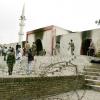Mob Justice: Disorder of the Day!
There seems to be no end to the spate of spine chilling incidents of mob violence. The alarming regularity at which such incidents are taking place leaves no doubt in the minds of the people that our country is on the verge of civil unrest. All in the name of democratic dissent, getting quick justice and a perceptible pessimism about bringing the offenders to book, people resort to vandalism, physical thrashing, killing and lynching every now and then.








